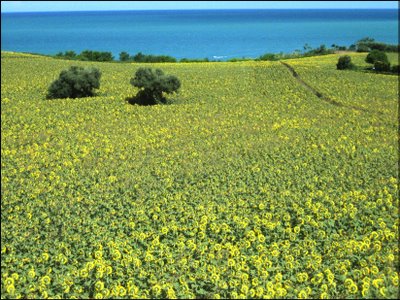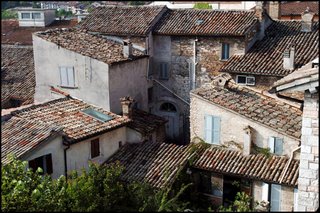WHY TRAVEL?
 WE STARTED THE DAY by climbing the tower of the well-preserved medieval castle in Offagna and then drove to Jesi for lunch.
WE STARTED THE DAY by climbing the tower of the well-preserved medieval castle in Offagna and then drove to Jesi for lunch. Of course, Jesi was essentially closed because of pausa (Italian siesta), so as soon as we finished our midday meals we dashed off to a vineyard in nearby Morro D’Alba.
The vineyard was a real treat – air condition and free wine. Nothing could have been better on a blazing summer day. We stayed for nearly three hours and then drove to Senigallia to meet a friend for drinks.
Well, drinks turned into dinner, which lead to a long stroll on the beach, and by the time we returned to our base camp (after driving in circles for a while when we got lost), a15-hour day had elapsed.
Then we ventured out on a similar journey the next day.
It was exhausting.
A few days after those marathon adventures, Philly posed an interesting question to the group, “Why do you like to travel?”
It was a valid query and one that seems to carry even more weight now – in this age of global terrorism, in an era when getting anywhere by plane is anything but simple and convenient and getting anywhere by car will cost you a month’s mortgage payment.
Why would you want to leave your comfortable home to wait in line for hours at airport security, then sleep in a hotel of questionable repute, eat all of your meals at unknown restaurants and waste a tank of gas driving around some city you’re visiting because it looked good in some glossy magazine?
It’s not like it’s cheap or anything. And in many parts of the world, like here in Italy, most people don’t even speak English.
Yet we all vacation and travel to some extent, whether it’s down the shore, across the country or around the world. We travel to get away from the daily grind, to forget about our everyday existences, to leave the cell phones behind and ignore the e-mail.
I find traveling to be even more rewarding, beyond simple escapism.
My answer to the Philly’s question was, “I like to travel because I want to know everything about everything.”
I want to know why Italian stores close all afternoon. I want to know why there are rocks on roofs of homes there. I want to know why there are so many castles in such close proximity of each other. I want to know why the wine in Le Marche has a higher alcohol content than most other places.
I want to know how life is different somewhere else and why.
From the top of the tower in Offagna, we could see Osimo, Loreto and Castelfidardo, three other fortress-like cities perched on different hills in different directions, separated only by a few kilometers. The castle towns, we learn, were established during the Middle Ages as a ring of protection for the primary city of the region, Ancona, which has the Adriatic Sea on its other flank.
The salty air wafting in off the Adriatic Sea cools the grapes that grow in Le Marche but it is the blistering Italian sun that gives them their intensity. The copious quantity of sunshine helps ripen the grapes and increases their sugar content. The high sugar levels make for higher alcohol percentages in the region’s wines.
The hot sun is also the reason why Italians close shop in the afternoons. Most people arrive early for work, then close at 12:30 for afternoon “pausa,” and then re-open around 4. In towns closer to the sea or further down the peninsula, the shops may not re-open until 5 or 5:30. Then people stay at work until 7 or 8.
It is just too hot to do anything during the midday hours. Outside of the larger cities, much of Italy is a ghost town on hot summer afternoons.
The winds can really pick up in Italy, with currents blowing in from both the Mediterranean and the Adriatic seas. A good gust will blow the orange, baked-brick tiles right off a person’s home.
 Unless you set some heavy rocks on top of them, that is.
Unless you set some heavy rocks on top of them, that is.During dinner in Senigallia, Philly sighed and then lamented, “I miss big coffee.”
In Italy, even the largest serving of coffee is less than one-third the size of the average Starbucks variety.
“It’s terrible, the American coffee,” our friend, Carlo Cleri, replied.
Cleri, who is an organizer of the local Slow Foods chapter in Italy, then proclaimed, “I hate Coke, too.”
And the girls gasped as though he had just burned an American flag.
“Slow food means the opposite of fast food,” Cleri explained. “In food, you can find history, culture.”
There are thousands of food products in Italy – from meats and cheeses to wines – that are only produced in small pockets of the country … and nowhere else in the world.
“We think diversity makes everything better,” Cleri said.
It is also the best reason to travel.
- G. Miller

2 Comments:
Dear urochise....
I think is REALLY IDIOT to judge a men using only a sentence. :)
However I will be really happy to taste whit you some good marche wines so you'll could feel the difference between a verdicchio and a Coke....
http://cagli-tricolore.blogspot.com/
FREE CAGLI!!
Post a Comment
<< Home